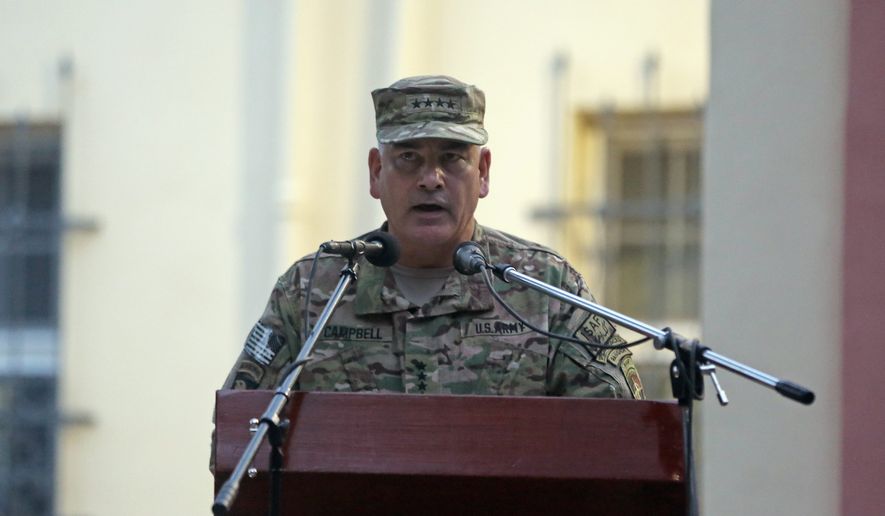The four-star general who oversees international military operations in Afghanistan will explain to lawmakers Thursday why he tried to conceal from taxpayers how their dollars are being spent on bolstering the country’s nascent security forces and then reversed himself.
Army Gen. John Campbell, commander of the International Security Assistance Force, is expected to explain to the Senate Armed Services Committee his decision to classify information, which federal watchdogs had been typically able to see, on how the government has been training and equipping Afghan troops.
The decision evoked the ire of such lawmakers as Sen. Claire McCaskill, who has publicly blasted Gen. Campbell’s efforts to hide the information and depicted his efforts as a blow to the “robust oversight” of government activity.
The Missouri Democrat and other lawmakers began pushing back against the general’s plan to protect what he sees as sensitive information under the blanket of a “classified” status after Special Inspector General For Afghanistan Reconstruction John Sopko exposed the plan outlined in a Jan. 30 report to Congress.
Just days later, Gen. Campbell began backpedaling on the classification claims, said Alex Bronstein-Moffly, a spokesman for Mr. Sopko.
The general met with Mr. Sopko in Afghanistan and informed him that he had changed his mind and “over 90 percent of the information would be declassified,” Mr. Bronstein-Moffly said. The general then provided the federal watchdog with three binders consisting of 900-to-1000 pages of documents, Mr. Bronstein-Moffly said.
Mr. Sopko is still sifting through the documents, he said.
The general’s reversal sparked concern of House Oversight Committee members, who sent a letter to Defense Secretary Chuck Hagel requesting an inventory of the new items that have been classified.
Committee Chairman Jason Chaffetz and Elijah Cummings, the committee’s ranking member, decided to formally request details about the expanded classification status since Gen. Campbell has not been specific about the type of information he is protecting.
“The safety and security of U.S. and NATO forces in Afghanistan are paramount,” the Utah Republican and Maryland Democrat stated in their Feb. 9 letter. “However, inappropriately classifying information severely restricts the ability of Congress to conduct meaningful oversight and impairs the ability of the American people to know how billions of their taxpayer dollars are being spent in Afghanistan.”
Government oversight organizations also have been critical about the classification expansion.
Mandy Smithberger, the director of the Straus Military Reform Project at the Project on Government Oversight (POGO), said Gen. Campbell’s push to conceal from the public what the military is doing with “a big bucket” of taxpayer money is “unacceptable.”
“There are ways that [information] can be released — and that SIGAR is able to report upon it — that protects our national security,” she said.
Questions about Gen. Campbell’s recent actions come just as the Obama administration is preparing to replace outgoing Defense Secretary Chuck Hagel with former Undersecretary of Defense Ashton Carter.
Mr. Carter assured lawmakers during his Feb. 4 confirmation hearing that he would caution the Pentagon against overclassifying information that might remove from taxpayers their ability to hold the military accountable for its actions and expenditures.
Some analysts have suggested that Gen. Campbell’s request to blot out information that might expose the vulnerabilities of Afghan troops is flawed, but not entirely unreasonable.
“From a Pentagon perspective, there’s very little upside to ever providing any information to the general public because, of course, your enemies can see everything and may well be able to find some vulnerabilities,” RAND Corporation Senior Political Scientist Jonah Blank said.
“However,” he cautioned, “the job of the civilian leadership is to balance the real threats that more openness entails with the benefits that more openness brings.”
Gen. Campbell will speak to lawmakers in public and also in private Thursday morning at a hearing on Afghanistan that begins at 9:30 a.m. It’s unclear whether he will address concerns about the classification expansion away from reporters and cameras.
• Maggie Ybarra can be reached at mybarra@washingtontimes.com.




Please read our comment policy before commenting.